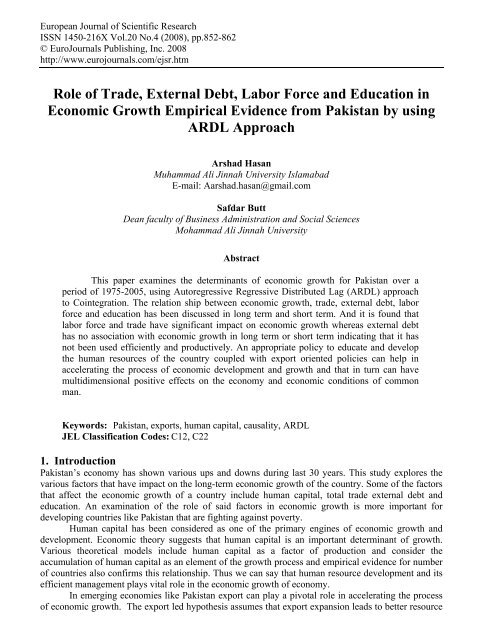European Journal of Scientific Research - EuroJournals
European Journal of Scientific Research - EuroJournals
European Journal of Scientific Research - EuroJournals
Create successful ePaper yourself
Turn your PDF publications into a flip-book with our unique Google optimized e-Paper software.
<strong>European</strong> <strong>Journal</strong> <strong>of</strong> <strong>Scientific</strong> <strong>Research</strong><br />
ISSN 1450-216X Vol.20 No.4 (2008), pp.852-862<br />
© Euro<strong>Journal</strong>s Publishing, Inc. 2008<br />
http://www.eurojournals.com/ejsr.htm<br />
Role <strong>of</strong> Trade, External Debt, Labor Force and Education in<br />
Economic Growth Empirical Evidence from Pakistan by using<br />
ARDL Approach<br />
Arshad Hasan<br />
Muhammad Ali Jinnah University Islamabad<br />
E-mail: Aarshad.hasan@gmail.com<br />
Safdar Butt<br />
Dean faculty <strong>of</strong> Business Administration and Social Sciences<br />
Mohammad Ali Jinnah University<br />
Abstract<br />
This paper examines the determinants <strong>of</strong> economic growth for Pakistan over a<br />
period <strong>of</strong> 1975-2005, using Autoregressive Regressive Distributed Lag (ARDL) approach<br />
to Cointegration. The relation ship between economic growth, trade, external debt, labor<br />
force and education has been discussed in long term and short term. And it is found that<br />
labor force and trade have significant impact on economic growth whereas external debt<br />
has no association with economic growth in long term or short term indicating that it has<br />
not been used efficiently and productively. An appropriate policy to educate and develop<br />
the human resources <strong>of</strong> the country coupled with export oriented policies can help in<br />
accelerating the process <strong>of</strong> economic development and growth and that in turn can have<br />
multidimensional positive effects on the economy and economic conditions <strong>of</strong> common<br />
man.<br />
Keywords: Pakistan, exports, human capital, causality, ARDL<br />
JEL Classification Codes: C12, C22<br />
1. Introduction<br />
Pakistan’s economy has shown various ups and downs during last 30 years. This study explores the<br />
various factors that have impact on the long-term economic growth <strong>of</strong> the country. Some <strong>of</strong> the factors<br />
that affect the economic growth <strong>of</strong> a country include human capital, total trade external debt and<br />
education. An examination <strong>of</strong> the role <strong>of</strong> said factors in economic growth is more important for<br />
developing countries like Pakistan that are fighting against poverty.<br />
Human capital has been considered as one <strong>of</strong> the primary engines <strong>of</strong> economic growth and<br />
development. Economic theory suggests that human capital is an important determinant <strong>of</strong> growth.<br />
Various theoretical models include human capital as a factor <strong>of</strong> production and consider the<br />
accumulation <strong>of</strong> human capital as an element <strong>of</strong> the growth process and empirical evidence for number<br />
<strong>of</strong> countries also confirms this relationship. Thus we can say that human resource development and its<br />
efficient management plays vital role in the economic growth <strong>of</strong> economy.<br />
In emerging economies like Pakistan export can play a pivotal role in accelerating the process<br />
<strong>of</strong> economic growth. The export led hypothesis assumes that export expansion leads to better resource

















